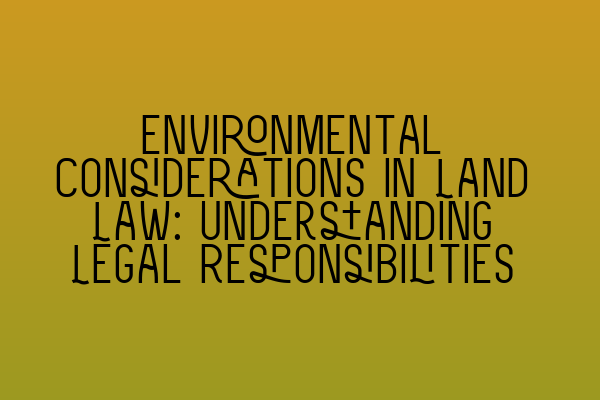Environmental Considerations in Land Law: Understanding Legal Responsibilities
When it comes to land law, it is essential to have a thorough understanding of the legal responsibilities related to environmental considerations. As a property owner or investor, being aware of and adhering to these responsibilities can have a significant impact on your property’s value, your legal standing, and the environment as a whole. In this blog post, we will explore the importance of environmental considerations in land law and outline the legal responsibilities that need to be considered.
1. Environmental Impact Assessment
Environmental impact assessment refers to the process of assessing the potential environmental effects of a proposed development or activity. This assessment aims to identify and mitigate any potential harm to the environment before permission is granted. As a property owner or investor, it is crucial to understand the legal requirement of conducting an environmental impact assessment for certain types of development projects. This assessment helps ensure that any adverse effects on the environment are duly evaluated and appropriate measures are taken.
For more information on environmental impact assessment, you can refer to our related article: SQE 2 Preparation Courses.
2. Environmental Permitting
Environmental permitting is another important aspect of environmental considerations in land law. It involves obtaining the necessary permits and licenses to carry out certain activities that may have an impact on the environment. Different activities, such as waste management, water pollution control, and emissions control, may require specific permits or licenses to ensure compliance with environmental regulations.
For more information on environmental permitting, you can refer to our related article: SQE 1 Practice Exam Questions.
3. Contaminated Land
Contaminated land refers to land that has been polluted by hazardous substances, making it potentially harmful to human health or the environment. In land law, it is crucial to understand the legal responsibilities when dealing with contaminated land. As a property owner or investor, you have an obligation to identify and remediate any contamination on your land, ensuring that it is safe for use and does not pose a risk to surrounding areas.
For more information on contaminated land, you can refer to our related article: SQE 1 Practice Mocks FLK1 FLK2.
4. Conservation Areas
Conservation areas are specific locations that are designated for their historical, architectural, or environmental significance. If your property falls within a conservation area, there are legal responsibilities that you must adhere to. These responsibilities include obtaining planning permissions for any changes or alterations to the property’s appearance, preserving its historic features, and ensuring the property’s overall conservation and enhancement.
For more information on conservation areas, you can refer to our related article: SQE 1 Preparation Courses.
5. Planning Policy and Development Control
Planning policy and development control are essential components of land law that often intersect with environmental considerations. Local planning authorities have the responsibility of assessing planning applications and considering the potential environmental impact of proposed developments. As a property owner or investor, it is crucial to understand the planning policies and regulations in your area to ensure compliance and minimize any negative environmental effects.
For more information on planning policy and development control, you can refer to our related article: SRA SQE Exam Dates.
Understanding and fulfilling your legal responsibilities regarding environmental considerations in land law is crucial for the protection of the environment, the value of your property, and your legal standing. By conducting environmental impact assessments, obtaining necessary permits, addressing contaminated land issues, complying with conservation area regulations, and being aware of planning policies, you can contribute to a sustainable and environmentally responsible approach to land ownership and investment.
For further information and resources on property law and land law, visit our website at SQE Property Law & Land Law.
